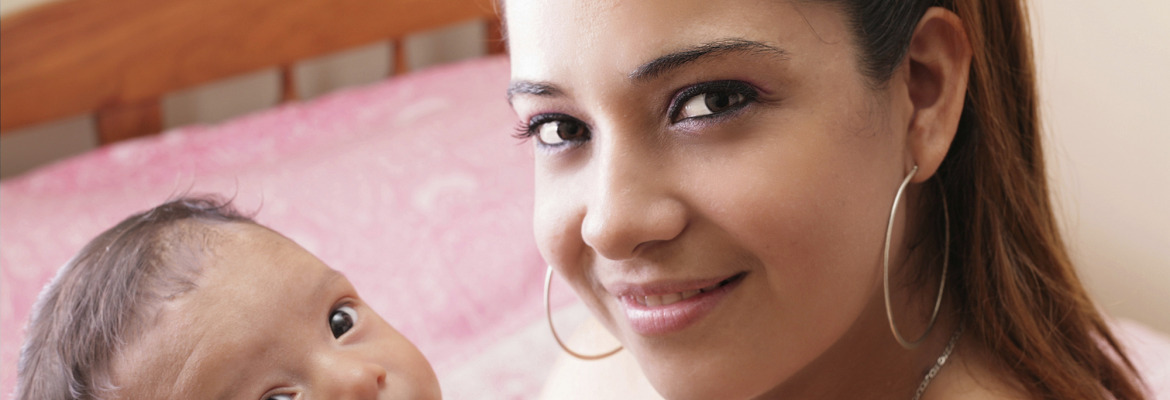
MIECHV Program
The federal Maternal, Infant, and Early Childhood Home Visiting program (MIECHV) was established in 2010 to give at-risk pregnant women and families necessary resources and skills to raise children who are healthy and ready to learn. The program provides grants to states and Indian Tribes to support voluntary home visiting models with an evidence-based track record of effectiveness. States and communities choose from among these models the approach that best meets community needs.
States and Tribes must address at least four of six benchmarks as outlined in the law:
- Improved maternal and newborn health
- Reduced child injuries, abuse, and neglect
- Improved school readiness and achievement
- Reduced crime or domestic violence
- Improved family economic self-sufficiency
- Improved coordination and referrals for community resources
In 2017, MIECHV reached families in 888 counties in all 50 states, the District of Columbia and five territories. MIECHV programs also operate in 25 Tribal communities, many of which operate enhanced or adapted models to fit culture and context. 50% of all MIECHV home visiting programs operate in rural communities. The program serves over 150,000 parents and children and provides about one million home visits each year. In 2017, 72% of participating families had household incomes below the poverty line. Of newly enrolled households,
- 22% reported a history of child abuse or maltreatment
- 15% included pregnant teens
- 12% reported substance abuse
MIECHV & Home Visiting Models
Under the law, MIECHV funding is limited to evidence-based program models with a demonstrated track record of effectiveness. The US Department of Health and Human Services began the Home Visiting Evidence of Effectiveness review to examine home visiting research literature and assess the evidence of effectiveness of home visiting program models. Any state or program model may request a review to be deemed an evidence-based model, but standards for acceptance are high.
MIECHV legislation requires a minimum of 75% of grant funding be spent on program models proven to be effective. If the state chooses, a smaller percentage of funding can be used to enroll families in models with promising practices. To date, states have opted to fund only evidence-based models.
The following models have been determined to meet HHS criteria:
- Attachment and Biobehavioral Catch-Up (ABC) Infant
- Child FIRST
- Early Head Start – Home-Based Option
- Early Intervention Program for Adolescent Mothers
- Early Start (New Zealand)
- Family Check-Up for Children
- Family Connects
- Family Spirit
- Health Access Nurturing Development Services (HANDS) Program
- Healthy Beginnings
- Healthy Families America
- Home Instruction for Parents of Preschool Youngsters (HIPPY)
- Maternal Early Childhood Sustained Home Visiting Program
- Maternal Infant Health Program
- Minding the Baby
- Nurse-Family Partnership
- Parents as Teachers
- Play and Learning Strategies (PALS) Infant
- SafeCare Augmented
Tribal MIECHV
In addition to state-specific MIECHV funds, there also exists a separate Tribal set-aside for Tribes to implement home visiting in their communities across the country. As ACF states, “The Tribal Home Visiting Program is designed to develop and strengthen tribal capacity to support and promote the health and well-being of American Indian and Alaska Native (AIAN) families; expand the evidence-base around home visiting in tribal communities; and support and strengthen cooperation and linkages between programs that service AIAN children and their families.” Tribal Home Visiting grantees are able to adopt home visiting models that are both evidence-based or deemed to be a promising approach, due to limited evidence on effective home visiting in Tribal communities.
ASTHVI’s Tribal Committee meets quarterly, and all Tribal grantees are welcome to attend, regardless of ASTHVI membership. Committee business includes providing formal comments to federal agencies and discussing ways to meet the needs of Tribal grantees. Reach out to us at admin@asthvi.org to receive connection information.
2023 meetings are as follows:
- Q1: Tuesday February 28, 3:00 EST
- Q2: Thursday April 27, 4:00 EST
- Q3: Tuesday, August 8, 3:00 EST
- Q4: Thursday, November 9, 3:00 EST
Still have more questions about Tribal home visiting? The below video and its accompanying videos in the Tribal home visiting series from ACF is a great place to keep learning!
